A surreal journey through the life of the Author, this "Traumoir" is now available for free. If what you're reading inspires or moves you, please consider purchasing Toughen Up for $30.
Or purchase a subscription to Memoiry Lane with Stephen Kearin for access to all the author's work.
Resources & Hotlines
DIAL 988: Immediately talk or text to chat with a trained crisis counselor 24/7 for anyone who needs support for suicidal, mental health and/or substance use crisis or other kinds of emotional distress. People can also dial 988 if they are worried about a loved one who may need crisis support.
Veterans Crisis Support: Dial 988 then PRESS 1 or text 838255
National Domestic Violence Hotline 24hrs: 1.800.379.SAFE (7233)
National Suicide Hotline 24hrs: 1.800.273.8255
Alcohol & Drug Abuse Hotline: 1.800.454.8966
NAMA – National Alliance of Mental Illness: 1.800.950.6264
Adult Children of Alcoholics & Dysfunctional Families: www.adultchildren.org
Alcohol Anonymous www.aa.org
_________________________________________________________________________
When I was born, my mother said I looked like an olive in a martini. I was jaundiced and had red hair and she took a long drag off of her Lucky Strike cigarette and said: “You just looked like a little olive in a martini to me, honey…but then you grew into the most beautiful Gerber baby.” But I never heard that second part…I just heard the first part. The part where I looked like an olive.
But she meant well. My mother meant well when she said: “Shut up” or “Cut the crap” or “Maybe you should put a cork in it, honey.”
I once became lost in a department store. My mother had taken us to Panorama City to go shopping and I had wandered into one of those circular clothing racks, because it looked like magic in there and when my mother looked around and couldn’t find me, she turned to my two sisters and said, “Let’s go!” When I came out of my little clothes fort...they were gone, and I started to cry, and I found the lady, and the lady found my mom, and my mom thanked the lady, and I was still crying, and so she took me by the little bicep, and she walked me around the corner, and she got down in my teary face, and she shook me, and she said, “Toughen up. (inhale) I’m not raising a momma’s boy.” (exhale)
And as we used to say about my mother at that time: She wasn’t raising anyone…at all. We were being lowered actually. My mother was lowering three children.
She had been born and lowered herself in Jersey City, New Jersey. “On the rivah” she used to say, as in “Why don’t you cry me one, sweetheart.” She was born Maureen Patricia-Ann Devlin, with green eyes, freckles and blazing red hair, and my mother came out of the womb, and the doctor lit her little baby cigarette...off of his, and she was outta there. She was the only girl who would jump off the pier and go swimming with the boys, because all the other girls…”were too afraid” The only thing she seemed afraid of was getting caught listening to country music, hiding those 78’s from her girlfriends between her mattresses and dreaming of one day meeting a handsome farm boy. Far-fetched for a city girl the likes of her, who by all accounts, ran with a pretty fast pack. She once took us to see the movie American Graffiti, and in the film some teenagers crawl under the back end of a squad car and set a hook around the rear axle, and then ran the chain around a lamp post, and then they Vroooooom! and the cops went, Screeech! Vrooom! Crash! still chained to the lamp post, and in the dark, she leaned over to us and whispered, “We did shit like that all the time”…and we believed her…our mother, the hustler, the hellraiser, the wee hooligan.
My mother’s mother was a nursing assistant, and an alcoholic, and a schizophrenic, and a drug addict, and was having a long-term affair with a Catholic...priest. A Catholic priest named, Father Kelly, and one day, Father Kelly, thought it was a good idea to take my mother and little Uncle Jimmy, and his girlfriend, my grandmother, and put them on a train and take them to California, and never come back. And when my grandfather, my mother’s father, discovered this, he had a very Irish reaction to it: He died. He died at them. I’d always heard three things about my grandfather: impeccable penmanship, took pictures of the Hindenburg exploding over his backyard fence, and died of a broken heart looking for his children. And what did my mother do when she, and her little brother, and her mother were put on a train, and taken to California and essentially kidnapped by a Catholic priest? She ran away to the Jews…but that’s another story.
My father was born on a farm in Ramona, South Dakota; one of fourteen children, two sets of twins…both of which died. In your face, Angela’s Ashes.
He was born, Eugene Andrew Kearin, with shiny black hair and brown eyes, and my father came out of the womb, got himself cleaned up and started looking for a God damned job, Stephen. The Kearins were farmers and miners. They mined for silver and mercury. My father’s first “job” when he was a small boy, was to have a rope tied around his waist, and to be lowered into a hole in the ground with little armfuls of dynamite. There were bootleggers in the family, like Uncle Connor, and Dad said, you could see him coming from far off over the snowfields at night, in a sled with barrels of bootleg whiskey stacked behind him, pulled by two giant horses that were so black, he said, they shined blue in the moonlight, with their wild eyes rolled into the back of their heads, and their long thick manes trailing behind them, their white breath hanging in the air, and Connor, with a bowler hat over one eye, a whip in one hand, a rifle across his lap, and a bulldog sitting tall off to his left, just longing for someone to start some shit. Whi-cha! Pat-a-pat-pat-a-pat-a-pat. These are my people.
My father’s mother would read the children stories next to the warm stove at night, but he swore his father never spoke a single word to him, and he could never remember the sound of his father’s voice.
They had a farm dog who refused to come indoors and the children rode a little horse who was half crazy, named Fox, who was barn sour, which meant that if he ever saw the barn, pat-a-pat-a-pat-a-pat-a-pat; he would run straight back to the barn, and Dad said, if you were on Fox and he saw the barn, pat-a-pat-a-pat-a-pat, you had a roundtrip ticket…and their mother would watch lovingly from the kitchen window, waving softly as she gave birth to more farm workers. (sound)
Dad said, when you got sick down on the farm, they would rub a mixture of kerosene and lard on your chest, and you would never admit to being sick again.
At seventeen my father lied about his age and ran away to fight with his brothers in WWII where he enlisted as a paratrooper, because it paid a little extra and they dressed better. The first plane he ever went up in, he jumped out of. Eventually, he would drop in over occupied France, part of the second wave northeast of Paris, helping to liberate a town called Reims. (Ranse) “Mopping up” he called it. Our Father fought Nazis during the day, and at night we’re sure he looked for work.
After years of occupation, Dad said the exhausted French mustered a “Thank you…now please leave!”
After the war came the National Guard, then drafted as a paratrooper into Korea, the only place colder than South Dakota, he always said.
Injured and hospitalized for months, my father was finally discharged, and settled in Los Angeles, where he learned to fly, then bought an airplane with his brothers…the same plane that my parents would circle The City of Angels in on their first date…a date originally between my mother and one of dad’s brothers, who had to cancel at the last minute, and asked my father if he could “take that bird flying.”
He put himself through night school by playing cards and pool, and everyone knew, for the rest of his life, never ever to play cards or pool with my father. He became a civil engineer, but he never got his license. His plan was just to outwork them all. “I want them to find me dead at my drawing table,” he told me once, “like Frank Lloyd Wright;” who didn't die at his drawing table, but we never told Dad that. An old colleague of his known as The Swede once took me aside and said, “You know, there is a saying about your father at City Hall. They say when Gene Kearin goes…who's going' to do the hard work?” I think it was my father's tireless work ethic and his combat experience in two wars, that prepared him perfectly for marriage to my mother.
We grew up on Valerio Street in the San Fernando Valley, next to the Knights of Columbus Hall in a tiny two-bedroom apartment next to busy Van Nuys Boulevard. I shared a room with my two sisters, that was so small that our beds touched. Lisa, seven years older than I am, and Sheila, two and a half and I used to stand at a little table in the corner with my eyes just above the edge, and I would watch Lisa in her cable knit sweaters and she would twirl her long thick black hair, and she would write her name in multi colored markers in a font that was so flamboyant...it almost got her thrown out of Catholic school. Lisa…the first artist I ever met, would listen to a guy named David Bowie, who I could clearly see from his album cover was a half man/half dog made of gold and we would listen to a band called The Beatles, and I remember staring at the cover of the Sgt. Pepper's album, and desperately wanting to ask my impossibly cool sister: Who are all those people? Are they all The Beatles? Or just some of them?
Our father worked so much during this time, that we used to go and smell his pillow and call it our dad and kiss it goodnight. It smelled like Old Spice, Brylcreem and coffee . Long after we went to bed, our mother would watch The Tonight Show with Johnny Carson and I would sometimes awaken to the sounds of the television laughter accompanied by the strangely comforting humming of the dishwasher, and then Dad would come home and come in and kiss us goodnight on our foreheads, always being careful to hold his hand over the engineering pens in his pocket, so they didn't cascade down into our open sleeping mouths. Some nights I would sneak out and I would watch The Tonight Show, with my mother, who loved show business SO much and she would say, “You see that guy, honey? That's Buddy Rich, he once played the drums upside down, and that's Totie Fields, look at that dress! Listen to that voice! And that…” she said “Pay attention…now, THAT is Geraldine.”
I would sometimes go around to where my father was at his drawing table in the dining room, because that's what my father did to unwind after work: he would work…at the same giant drawing table we would hold onto as toddlers, and learn to walk. Late at night, I would stand on the back of his stool with my hands on his shoulders and I would look out over a sea of paper, at these mysterious drawings that he would work on, and I never knew what they were or what they meant, and there were pens and pencils and math, a big sliding straight edge and an invention straight out of the mind of H.G. Wells known as an electric eraser.
But most nights, I remember waking up to the sound of my parents fighting.
When my parents fought, my father would go country quiet, often just lowly repeating my mother's name, “Maureen. Maureen. Maureen.” She would lock herself in the bathroom and turn on the shower and the sink, creating a wall of sound and he would stand with his head against the door, trying the knob “Maureen chicka chicka Maureen chicka chicka Maureen chicka chicka chicka.
When she finally did come out of the bathroom, my mother was, as they say, “up for it.”
She once took a pair of pinking shears, meticulously cut up my father's suits, gathered them into a ball, and threw them out on the strip of lawn bordering Valerio Street, while the neighbors went (swish) and then (swoosh)
During another one of their fights, Mom laid on her back for leverage and kicked the sliding glass window in our dining room with both feet until it shattered, dropping guillotine blades of glass down all around her, she, somehow escaping quadruple amputation in the process.
When tempers started to ramp up between my parents, my sisters told me that our mother would sometimes discreetly take them aside and ask them to please go to the kitchen, and quote: “Get me a knife” as if to say, now girls, be good little accessories to a crime, so I can kill your father. “Go get me a knife…and while you’re there, get some formula and feed your little brother.”
My mother had suffered from spinal meningitis in her late twenties, and we never knew if her wild swings of emotion were a result of this, or being raised by her mother, or being Irish, or being a redhead, or being from New Jersey or just being her. I think it’s safe to say when you ask two young girls to go fetch you a knife so you can kill their father, you’re probably pulling from a number of multi-colored threads that are woven into your rich, family tapestry.
I recently was talking to my cousin, who's also my stepsister. That's in case anyone's thinking of getting off this train early...and she said, “I was over at your house once, and your mom threw Lisa's birthday cake at your, dad,” and I said “She threw birthday cake at my dad?” and Diane said, “THE birthday cake—she threw the entire birthday cake at your, dad.” which I thought was an important distinction. The only food I had ever known my mother to throw was at Easter, when she repeatedly attempted to inbound a ham through the same sliding glass-window she had kicked out previously…but because of the gelatinous coating that encases ham, Uhz-la-swee, it sort of, Zu-la-swi, Zu-lash-eeee! She didn't think it through; a turkey would have made it, and probably on the first try. What my mother had against this particular sliding glass door in our dining room in Van Nuys was never clear.
The only one of us who could stop a fight, temporarily at least, was Lisa because she had the loudest scream. She would scream “Stop!” and if that didn’t work, she would just scream scream. They would stop long enough to discipline her and send her to our room, then drop the needle right back where the fight soundtrack left off.
Like I said, my father would go country quiet in their fights and thankfully never once raised a hand to my mother, but should the ketchup bottle not open on the first attempt, lightning would enter the top of my father's head, popping one eye open and closing the other, then travel down his jaw, shoving it off to one side, and constricting his vocal chords so he sounded like an old miner, and the lightning would flash and branch down his legs causing him to dance a little box step, and it would ball up one of his hands and he would point at a bottle of ketchup and invoke the Son of God “Well, Chriiiiiist Almighty!” he would growl. There were God damned screws that wouldn’t turn and sonofabitchin’ drawers that got jammed. It all seemed personal and like disrespect to him, as if the drawer was saying “Pull all you wish…I won’t be opening for you, Gene Kearin!” Once, when I was a little boy, we missed an exit on the freeway and I witnessed my father start to glow bright orange like a heating coil as he attempted to pull the wheel off of the steering column and I remember asking him if he was mad, and Dad said: “I don’t get mad…dogs get mad.” Looking back, if that wasn’t mad…I’m sure glad we didn’t own a dog.


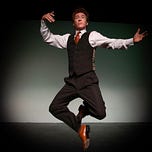



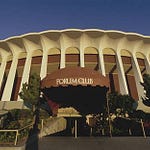

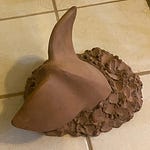
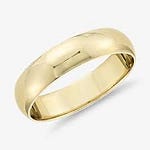
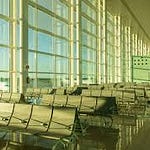
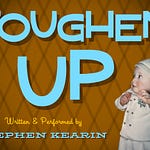
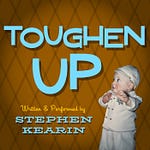
Share this post